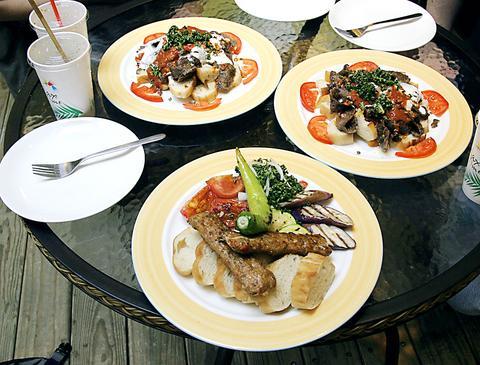Taipei's first kebab shop opened just three weeks ago and has already built up a strong following. Its hearty Turkish grilled meat combos are currently popular with office workers out for a quick feed, local residents looking for something more substantial and expats in search of familiar tastes from home.
The brainchild of Jerry Hsu (

PHOTO: GAVIN PHIPPS, TAIPEI TIMES
Offering diners a clean, pleasant, roomy and inoffensive environment, the Doner's small, yet solid menu is, according to Hsu, still a work in progress. Those craving grilled Turkish treats should find the few items currently available to their liking. The drawback is the lack of dips. While Hsu has mastered the garlic and cucumber yogurt sauce the lack of tahini in Taiwan has meant that humous is, at present, not on the menu.
The most popular of the dishes on offer is the Turkish soda bread kebab. Available in beef, chicken, or a mixture of both, the hearty kebab comes stuffed with salad and is topped off with Hsu's homemade garlic yogurt sauce and costs NT$110. Hsu also offers Lebanese, or flat pita bread wraps, which cost NT$110 and are
available in the same combinations as the Turkish kebab.
Diners looking for more than a simple sandwich should try one of one of Hsu's set meals. The priciest of these is the NT$450 Kusbasi kebab, or a fillet of lamb served with mixed vegetables, Turkish bread and onion salad. The Adana kebab -- two spiced lamb kebabs cooked with capsicum and served with mixed vegetables, Turkish bread and a huge fiery green pepper -- and the Ishender kebab, a plate of beef topped off with garlic yogurt and chili sauce served on a bed of Turkish soda bread, both cost NT$300. Side orders of French fries are available on request for diners wanting that extra bit of cholesterol with their meal.
Hsu plans to add more Mediterranean-based meat and fish dishes as well as several vegetarian choices, including falafel in the near future. But for now, diners will have to make do with the basics. Not that there's anything wrong with that, as Hsu's kebabs hit the spot and diners will walk away from any meal at the Doner satisfied.

April 14 to April 20 In March 1947, Sising Katadrepan urged the government to drop the “high mountain people” (高山族) designation for Indigenous Taiwanese and refer to them as “Taiwan people” (台灣族). He considered the term derogatory, arguing that it made them sound like animals. The Taiwan Provincial Government agreed to stop using the term, stating that Indigenous Taiwanese suffered all sorts of discrimination and oppression under the Japanese and were forced to live in the mountains as outsiders to society. Now, under the new regime, they would be seen as equals, thus they should be henceforth

Last week, the the National Immigration Agency (NIA) told the legislature that more than 10,000 naturalized Taiwanese citizens from the People’s Republic of China (PRC) risked having their citizenship revoked if they failed to provide proof that they had renounced their Chinese household registration within the next three months. Renunciation is required under the Act Governing Relations Between the People of the Taiwan Area and the Mainland Area (臺灣地區與大陸地區人民關係條例), as amended in 2004, though it was only a legal requirement after 2000. Prior to that, it had been only an administrative requirement since the Nationality Act (國籍法) was established in

With over 80 works on display, this is Louise Bourgeois’ first solo show in Taiwan. Visitors are invited to traverse her world of love and hate, vengeance and acceptance, trauma and reconciliation. Dominating the entrance, the nine-foot-tall Crouching Spider (2003) greets visitors. The creature looms behind the glass facade, symbolic protector and gatekeeper to the intimate journey ahead. Bourgeois, best known for her giant spider sculptures, is one of the most influential artist of the twentieth century. Blending vulnerability and defiance through themes of sexuality, trauma and identity, her work reshaped the landscape of contemporary art with fearless honesty. “People are influenced by

Three big changes have transformed the landscape of Taiwan’s local patronage factions: Increasing Democratic Progressive Party (DPP) involvement, rising new factions and the Chinese Nationalist Party’s (KMT) significantly weakened control. GREEN FACTIONS It is said that “south of the Zhuoshui River (濁水溪), there is no blue-green divide,” meaning that from Yunlin County south there is no difference between KMT and DPP politicians. This is not always true, but there is more than a grain of truth to it. Traditionally, DPP factions are viewed as national entities, with their primary function to secure plum positions in the party and government. This is not unusual